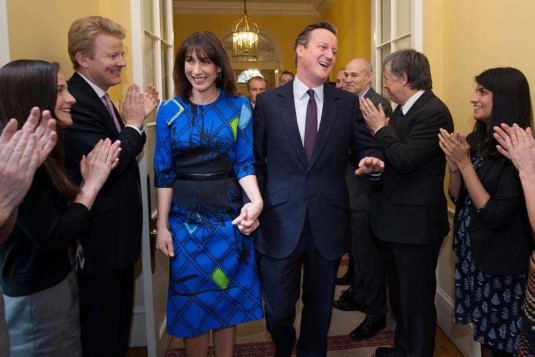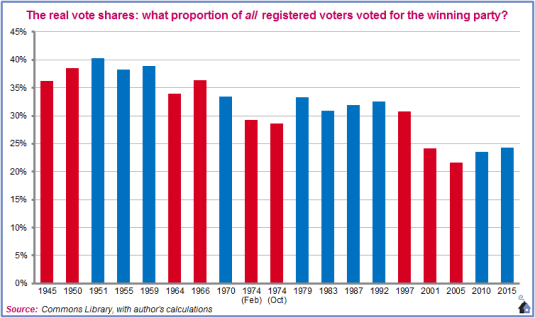
When you're trying to make predictions about social phenomena, because they're so dynamic and fluid anything approaching a forecast has to be couched in probabilities. It is highly likely, for instance, that when I go to work tomorrow the train will pull up at the platform around 8.30am. The train driver has to work for a living, and so is very likely to clock on in the morning. It runs to a timetable that has been in force for 20 years, and the operator expects the driver to depart and arrive according to that. I can't be totally certain the train will turn up, but a reasonable expectation of punctuality can be made based on experience.
This is why the Conservative victory was a deeply unpleasant bolt from the blue. Despite Labour's problems, the Tories have been weakening over time. Since the first European elections in 1979, Conservative shares have been 51% (1979), 38.8% (1984), 35% (1989), 28% (1994), 36% (1999), 36% (2004), 27.7% (2009), and 23.1% (2014). The story is the same in general election contests. From a highpoint in 1955, in which Anthony Eden secured 49.7% of the vote, shares have slid ever since. In 2010 it was 36.1%, and rose to 36.9% last month. There's also this, courtesy of ConHome:

Just under a quarter of all eligible voters supported the blue party. Better than Labour in 2001 and 2005 to be sure, but their win is fully in line with their decline over time. Small wonder they're keen on gerrymandering constituency boundaries and allowing ex-pats to vote. In addition to that, membership has plummeted. Unlike Labour who counts only those who sign up and pay up as members, the Tories have a mixed system. The party counts those who pay a sub and those who are members of Conservative social clubs, of which there remain a surprising number knocking about. This helps explain why, until relatively recently, the Tories always had many more members than Labour. Now? The social club numbers could well be working to conceal the real figures. Therefore knowing the trend, and observing that it is extremely rare for an incumbent government to put on votes and seats, this was why right up to 10pm on election night I was adamant that not only would the Tories lose, I was sure they'd be hard-pressed ever to win again. Probabilities, eh?
When you look at why it this reasonable supposition, an understanding of the deep social processes that have worked against the social roots of political parties does, in their case, give them a number of advantages. The story of the last 30-odd years has been the dissolution of whole chunks of labour and capital that underpinned the post-war social order (see here and here for starters). The overall effect has been greater uncertainty and anxiety among wide layers of the general population. Whereas in the post-war order there was a certainty fixity - working class boys got working class jobs, middles class kids went to grammars, universities, and onto "good careers", women were much more marginal to the workforce, (non-white) immigrants did the menial jobs no one wanted, and significant numbers could look forward to a job-for-life; all that has gone. With their disappearance and, of course, a wobbly economy (not in the least bit helped by Dave's ridiculous EU referendum), uncertainty stalks the land. Your job, it could vanish tomorrow. Your savings, they might vanish in another crash. Your town centre, changed by a babble of foreign tongues. Your green spaces, building sites for new housing. Your health, it might be jeopardised by A&E waits. On and on it goes. As people (hardworking, of course) struggle to keep their heads above water they know the rug could be torn from under them at any time.
This pool of deeply anxious people is the well from which the Tories can draw electoral success. Their politics are all about upping the uncertainty ante. Anxiety fuels anomie and makes for a more pliant, accepting, manageable populace that are unlikely to threaten the party with scrutiny, let alone challenge the interests that stand behind them. But more than that social angst is the ideal fodder for Conservative messaging. Consider the messaging the Tories consistently used throughout the election campaign. 'Long-term economic plan', 'Northern powerhouse', 'securing a better future', 'competence vs chaos', 'strong leadership', it was all flim-flam but they successfully appealed to (atomised) voters' need to believe something better, something more tangible and stable was just around the corner. Yet as the Tories flattered the aspirations they stuck knitting needles deep into the insecurities. While the economic credibility card damaged Labour, which wasn't helped by its own inconsistencies, what really boosted the Tories was talking up the SNP as a "threat". Firstly, having established in the minds of large numbers of English voters - and not just those who lean to the Tories - that Scotland is carried about by hardworking families like you, they were able to successfully tie the prospect of economic armageddon, the scrapping of Trident, and the abolition of the union together in a fearful toxic mix. The perception of threat, which in actuality was utterly non-existent, struck a chord among millions of voters deeply anxious of the present and future. It was classic carrot and stick.
Whereas the constituencies of the main parties were more or less structured by and articulated through the institutions of the post-war period, their disaggregation has left a pool of voters who are disposed to vote Tory precisely because the party and its innumerable mouthpieces position it as an agency of certainty. Of course, a cursory glance at their record and their programme reveals an organisation that is anything but - another few ironic chuckles history is fond of. What that also means is another five years of continued anxiety lays the groundwork for another Conservative victory. It makes that more probable, more likely than previously thought.
2 comments:
Let's not forget that Labour either led the Tories or were neck-and-neck in most age groups - the big outlier being the over-65s, which had the fatal combination of a big Tory lead and a much higher tendency to vote. The Tories won by alternately bribing and scaring pensioners; Labour lost by not having a strong enough message to mobilise the rest of us.
The Scottish result where the SNP got over 90% of the seats with 35% voting SNP, 35% voting other, and 30% not voting when combined with Cameron getting into Downing St with 24% is making me think the system is broke. A little bit more interested in the Presedential race at the moment as I think Hilary has blown it. To much thinking hurts.
Post a Comment